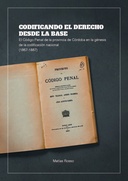Explore

Codificando el derecho desde la base. El Código Penal de la provincia de Córdoba en la génesis de la Codificación Nacional (1867-1887)
Matías Rosso
2022
0 Ungluers have
Faved this Work
Login to Fave
The federal system adopted in the constituent process of 1853-1860 responded, on the one hand, to the confederative experience of previous years and, on the other, to the imprint of the model based on the Constitution of the United States of America of 1787. However, the Argentine constituents departed from this model by granting the National Congress the power to dictate the "civil, commercial, criminal and mining" Codes (Art. 67, sub. 11 CN). In this way, the constitutional organisation reflected the federal aspiration that allowed the provinces to preserve their historical-political identity, but various circumstantial reasons, such as the shortage of lawyers in the interior of the country and the felt need to standardise customs and legislation, led the Convention members to adopt the European system of codification in the area of substantive law. As a result of this process, a hybrid model was established, with federal features as regards the exercise of political and jurisdictional powers at the provincial level, but with a clear unitary element in the codification of substantive law. The reservation added in 1860 reinforced the intangibility of the jurisdictional power of the provinces, which thus retained their own courts and the power to regulate their procedural law. On the other hand, it was provided that until the National Congress enacted the substantive codes, the provinces were empowered to maintain their civil and criminal legislation (art. 108 CN). The first Argentine Criminal Code would not come into force until 1887, so, in exercise of this transitory power, many provinces adopted various codification projects in the previous years that were exclusively within their territorial scope. The Tejedor Project was adopted by the Province of Buenos Aires in 1877; La Rioja, which was the pioneer, adopted it in 1876; Entre Ríos, San Juan, Corrientes, San Luis and Catamarca in 1878; Mendoza in 1779; Santa Fe and Salta in 1880 and Tucumán in 1881; and the Provinces of Jujuy and Santiago del Estero did not adopt provincial codes but were governed by Castilian law until the first National Code was enacted. Cordoba, for its part, adopted, practically unchanged, the draft of the revision commission presented to the National Congress in 1881. This book attempts to analyse some aspects of that first moment of provincial codification, focusing on the Criminal Code in force in the Province of Cordoba between 1882 and 1886, trying to understand the way in which the operators of justice in Cordoba represented the codified law and to determine to what extent it is possible to associate that representation with what has been called "code culture". We believe that the experience of provincial codification cannot be fully understood without taking into account the way in which the new law was used in the courts. In this sense, the Historical Archive of the Province of Cordoba preserves, in its Crime Fund, an important number of cases that were consulted and analysed in this work. The documentary universe for the period in which the code was in force (1883-1886) is 403 cases. The aim is to offer a qualitative analysis which, based on the documentary testimonies, allows us to offer an adequate description of the features which, in terms of legal culture, can be considered characteristic of the practical experience of the provincial penal codification.
This book is included in DOAB.
Why read this book? Have your say.
You must be logged in to comment.
Rights Information
Are you the author or publisher of this work? If so, you can claim it as yours by registering as an Unglue.it rights holder.Downloads
This work has been downloaded 121 times via unglue.it ebook links.
- 121 - pdf (CC BY-NC-ND) at e-archivo.uc3m.es.
Keywords
- Argentina
- c 1800 to c 1900
- Codificación
- Codification
- Código Penal
- Córdoba (Argentina)
- crime
- Crimen
- Criminal law & procedure
- Geographical Qualifiers
- Historia del derecho
- history of law
- justice
- Justicia
- Latin America
- Law
- Laws of Specific jurisdictions
- Modern period, c 1500 onwards
- Penal Code
- South America
- The Americas
- Time periods qualifiers
Editions

